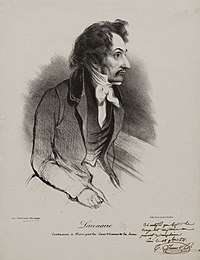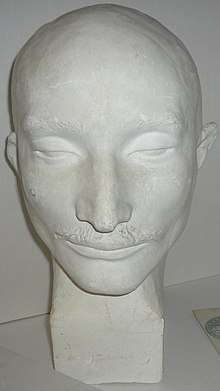Pierre François Lacenaire
Pierre François Lacenaire (20 December 1803 – 9 January 1836) was a French murderer and would-be poet.

Biography

Lacenaire was born in Francheville, Rhône, near the city of Lyon in eastern France. His parents were Jean-Baptiste Lacenaire, a bourgeois merchant, and Marguerite Gaillard.
Upon finishing his education with excellent results, he joined the French army, eventually deserting in 1829 at the time of the expedition to Morea. He then became a criminal and was in and out of prison, which was, as he called it, his "criminal university."
While in prison, Lacenaire wrote a satirical poem, "Petition of a Thief to a King, his Neighbor." He also wrote an article titled "The Prisons and the Penal Regime" for a magazine.
To aid him in committing his crimes, Lacenaire recruited two henchmen, Pierre Victor Avril (whom he had met while in prison) and Hippolyte François.
In the months between the beginning of his trial for a double murder and his execution, he wrote Memoirs, Revelations and Poems.[1] During his trial, he fiercely defended his crimes as a valid protest against social injustice. He turned the judicial proceedings into a theatrical event and his prison cell into a salon. He made a lasting impression upon French society and upon several writers, such as Balzac and Dostoevsky.
He was executed on the guillotine at the age of 32.
In literature and film
- His hand, severed after death, was the subject of a poem by Théophile Gautier.[2]
- Dostoyevsky read about Lacenaire's case and there are some similarities between his crime and Raskolnikov's crime in Crime and Punishment. In another of his novels, The Idiot, the character Yevgeny Pavlovitch mentions Lacenaire when discussing Hippolite's suicide attempt with the prince.[3]
- He is depicted in the French film Children of Paradise (Les Enfants du Paradis, 1945), directed by Marcel Carné from a script by Jacques Prévert, where his stance as a loner and a rebel is stressed. In the film, Lacenaire (Marcel Herrand) refers to himself as a bold criminal and a social rebel, but his actual criminal activities mostly stay outside the film's narrative.
- Philosopher Michel Foucault believed Lacenaire's notoriety among Parisians marked the birth of a new kind of lionized outlaw (as opposed to the older folk hero), the bourgeois romantic criminal, and eventually to the detective and true crime genres of literature.
- There is a French film called Lacenaire (1990) starring Daniel Auteuil.
- The work Enamels and Cameos is referenced in "The picture of Dorian Gray" by Oscar Wilde. Wilde makes mention of two poems: "Lacenaire" and "On the Laggons". Chapter 14, Barnes and Nobles edition 2003.
See also
References
- Stead, Philip John (tr.), The Memoirs of Lacenaire (London, 1952)
- Gautier, Théophil (1887) [1887]. "Étude De Mains" [Studies of Hands]. Émaux et Camées [Enamels and Cameos] (poem) (in French). Paris: Librairie L. Conquet. pp. 15–19. Retrieved 1 May 2010.
Curiosité Depravée !
- Dostoyevsky, Fyodor (April 2010) [First published in Russian in 1869]. "Part II, chap. 7" (novel)
|chapter-format=requires|chapter-url=(help). The Idiot. United States of America: Signet Classics. p. 441. ISBN 978-0-451-53152-0.
Bibliography
- Irving, H.B. (1901). Studies of French Criminals of the Nineteenth Century. London: William Heinemann. pp. 3–48.